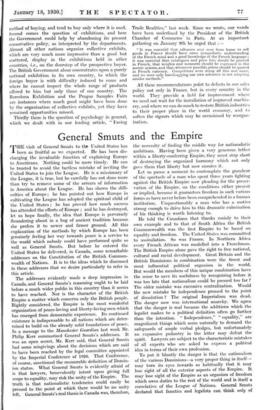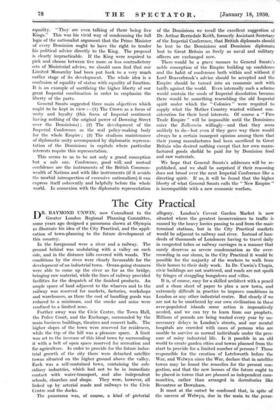General Smuts and the Empire
2m-1E visit of General Smuts to the United States has been as fruitful as we expected. He has been dis- charging the invaluable function of explaining Europe to Americans. Nothing could be more timely. He can be trusted to avoid the tactless mistake of inviting the United States to join the League. He is a missionary of the League, it is true, but he carefully has not done more than try to remove some of the arrears of information in America about the League. He has shown the diffi- culties of Europe; he has pointed out how Europe in cultivating the League has adopted the spiritual child of the United States ; he has proved how much success has attended the efforts of Europe ; and he has destroyed, let us hope finally, the idea that Europe is perversely floundering about in a bog of ancient tradition because she prefers it to newer and firmer ground. All this explanation of the methods by which Europe has been genuinely feeling her way towards peace is a service to the world which nobody could have performed quite so well as General Smuts. But before he entered the United States he delivered, in Canada, some remarkable addresses on the Constitution of the British Common- wealth of Nations. It is to the ideas which he discussed in these addresses that we desire particularly to refer in this article.
The addresses evidently made a deep impression in Canada; and General Smuts's reasoning ought to be laid before a much wider public in this country than it seems to have reached. Nor is the character of the British Empire a matter which concerns only the British people. Rightly considered, the Empire is the most wonderful organization of peace-loving and liberty-loving men which has emerged from democratic experience. Its continued existence is indispensable to all nations which are deter- mined to build on the already solid foundations of peace. In a message to the Manchester Guardian last week Mr. Philip Kerr summarized General Smuts's addresses. It was an open secret, Mr. Kerr said, that General Smuts had some misgivings about the decisions which are said to have been reached by the legal committee appointed by the Imperial Conference of 1926. That Conference, of course, sanctioned the memorable definition of Domin- ion status. What General Smuts is evidently afraid of is that lawyers, benevolently intent upon giving full scope to equality, may risk the unity of the Empire. The truth is that nationalistic tendencies could easily be pressed to the point at which there would be no unity left. General Smuts's real thesis in Canada was, therefore, the necessity of finding the middle way for nationalistic ambitions. Having been given a very generous tether within a liberty-conferring Empire, they must stop short of destroying the organized harmony which not only gave them that liberty but now ensures it.
Let us pause a moment to contemplate the grandeur of the spectacle of a man who spent three years fighting against the British Empire now pleading for the preser- vation of the Empire, on the conditions either present or implied, because it guarantees freedom in such various forms as have never before been comprehended in a human institution. Unquestionably a man who has a motive strong' enough to drive him to this dramatic culmination of his thinking is worth listening to.
He told the Canadians that thanks mainly to their own example and to that of South Africa the British Commonwealth was the first Empire to be based on equality and freedom. The United States was committed to assimilation. So was France. In Northern Africa every French African was modelled into a Frenchman. The British Empire alone gave the right to free national, cultural and racial development. Great Britain and the British Dominions in combination were the freest and most influential political organism in the world. But would the members of this unique combination have the sense to save its usefulness by recognizing before it was too late that nationalism could be pressed too far ? The older mistake was excessive centralization. Would the new mistake be independence pressed to the point of dissolution ? The original Imperialism was dead. The danger now was international anarchy. We agree that the danger is real because the additions which the legalist makes to a political definition often go further than the intention. " Independence," " equality," are magnificent things which seem naturally to demand the safeguards of ample verbal pledges, but unfortunately an expansive pedantry in the letter may defeat the spirit. Lawyers are subject to the characteristic mistakes of all experts who are asked to express a political idea in terms of their own profession.
To put it bluntly the danger is that the nationalism of the various Dominions—a very proper thing in itself— may turn its eyes inwards so habitually that it may lose sight of all the exterior aspects of the Empire. It may lose sight of the Empire as an organism of freedom which owes duties to the rest of the world and is itself a correlative of the League of Nations. General Smuts declared that fanatics and legalists can think only of equality. " They are even talking of there being five Kings." This was his vivid way of condemning the full logic of the nationalist argument that the Prime Minister of every Dominion ought to have the right to tender his political advice directly to the King. The proposal is clearly impracticable. If the King were required to pick and choose between five more.or less contradictory sets of Ministerial advice, we should soon find that our Limited Monarchy had been put back to a very much earlier stage of its development. The whole idea is a confusion of equality of status with equality of function. It is an example of sacrificing the higher liberty of our great Imperial combination in order to emphasize the liberty of the parts.
General Smuts suggested three main objectives which ought to be kept in view :—(1) The Crown as a focus of unity and loyalty (this focus of Imperial sentiment having nothing of the original power of Downing Street over the Dominions) ; (2) The development of the Imperial Conference as the real policy-making body for the whole Empire ; (8) The studious maintenance of diplomatic unity accompanied by diplomatic represen- tation of the Dominions in capitals where particular interests require this representation.
This seems to us to be not only a grand conception but a safe one. Conference, good will, and mutual confidence are the instruments of the British Common- wealth of Nations and with like instruments (if it avoids the morbid introspection of excessive nationalism) it can express itself coherently and helpfully before the whole world. In connexion with the diplomatic representation of the Dominions we recall the excellent suggestion of Dr. Arthur Berriedale Keith, formerly Assistant Secretary of the Imperial Conference, that British diplomats should be lent to the Dominions and Dominion diplomats lent to Great Britain as freely as naval and military officers are exchanged now.
There would be a grave menace to General Smuts's noble conception of the Empire building up confidence and the habit of conference both within and without if Lord Beaverbrook's advice should be accepted and the Empire should be turned into an economic unit with tariffs against the world. Even internally such a scheme would contain the seeds of Imperial dissolution because there would be something resembling the old Imperial spirit under which the " Colonies " were required to supply what the Mother Country wanted without con- sideration for their local interests. Of course a " Free Trade Empire " will be impossible until the Dominions enter the Zoilverein willingly—and that they _seem unlikely to do—but even if they gave way there would always be a certain insurgent opinion among them that their young manufactures had been sacrificed to Great Britain who desired nothing except that her own manu- factured goods shotild be paid for by Dominion food and raw materials.
We hope that General Smuts's addresses will be re- published, and we shall be surprised if their reasoning does not brood over the next Imperial Conference like a directing spirit. If so, it will be found that the higher liberty of what General Smuts calls the " New Empire " is incompatible with a new economic warfare.







































 Previous page
Previous page